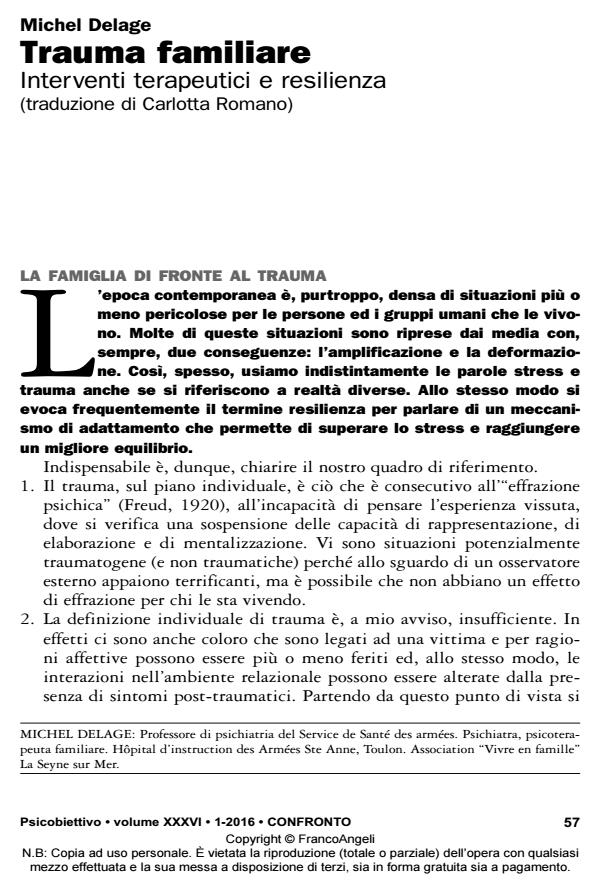The family trauma. Therapeutic interventions and resilience
Journal title PSICOBIETTIVO
Author/s Michel Delage
Publishing Year 2016 Issue 2016/1
Language Italian Pages 20 P. 57-76 File size 123 KB
DOI 10.3280/PSOB2016-001004
DOI is like a bar code for intellectual property: to have more infomation
click here
Below, you can see the article first page
If you want to buy this article in PDF format, you can do it, following the instructions to buy download credits

FrancoAngeli is member of Publishers International Linking Association, Inc (PILA), a not-for-profit association which run the CrossRef service enabling links to and from online scholarly content.
The family trauma refers to the fact that a family, who is confronted with a serious issue, undergoes a wound in the relations that harshly impact the family life permanently. Sometimes, these bounds are destroyed completely. The aim of this work is to examine the symptoms of the family trauma, for example analyzing the consequences of the trap in which several partners find themselves in when they become unable to share and mentalize their emotions. Resiliency involves an interpersonal process, which allows finding in the family an efficient functionality allowing a neutralization work likely to transform the trauma into a story integrated into family life. Therapeutic interventions aim at re-establishing a sufficient security in the family, and he work of emotional regulation and the development of narrative activity.
Keywords: Traumatic Crise; Traumatic Trap; Family Resiliency; Narrative Activity; Mentalisation
- Byng-Hall J. (1995) Rewriting Family Scripts. Improvisations and systems change, Guilford Press, London
- Cyrulnik B. (2012) Pourquoi la résilience in B. Cyrulnik, G. Jorland (eds): Résilience, connaissances de base, Odile Jacob, Paris, pp. 7-17 Cyrulnik B. (1999) Un merveilleux malheur, Odile Jacob, Paris
- De Clercq M. (1995) “Les répercussions du syndrôme de stress post-traumatique sur les familles”, Thérapie familiale, 16: 185-193
- Decherf G. (2003) Souffrances dans la famille, Inpress, Paris
- Delage M. (2008) La résilience familiale, Odile Jacob, Paris
- Delage M. (2010) “La famille confrontée au traumatisme”, in Delage M.,
- Cyrulnik B. (eds.), Famille et résilience, Odile Jacob, Paris, pp. 17-27
- Delage M. (2012) “Résilience et famille”, in Cyrulnik B., Jorland G. (eds.), Résilience. Connaissances de base, Odile Jacob, Paris, pp. 97-113
- Delage M. (2013) La vie des émotions et l’attachement dans la famille, Odile Jacob, Paris
- Fonagy P., Target M. (1997) “Attachment and reflexive function: their role in self organisation”, Dev. Psychopathology, 9: 679-700
- Freud S. (1920) Au delà du principe de plaisir. Essais de psychanalyse, Payot, Paris
- Johnson M. (2003) “On trading adolescent girls. Focus and strengths and resiliences in psychotherapy”, JCCP in session, 59, 11: 1193-1203
- Ogden P., Minton K., Pain C. (2006) Trauma and the body: a sensorimotor approach to psychotherapy, W.W. Norton et Company, New York
- Ricoeur P. (1983-1985) Temps et récit, Seuil, Paris
- Rime B. (2005) Le partage social des émotions, PUF, Paris
- Walsh F. (1998) Strengthening family resilience, Guilford Press, New York
Michel Delage, Trauma familiare Interventi terapeutici e resilienza (traduzione di Carlotta Romano) in "PSICOBIETTIVO" 1/2016, pp 57-76, DOI: 10.3280/PSOB2016-001004